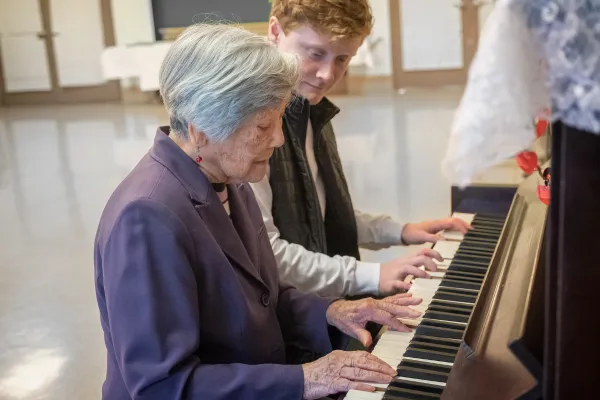
Read Our Blogs

The Benefits of Music Therapy for Seniors: Healing and Harmony
Music, a universal language that transcends words and cultures, has a profound impact on our emotions, minds, and bodies. It can soothe our souls, uplift our spirits, and transport us to another time and place. For seniors, music therapy can be a powerful tool for enhancing their well-being, promoting relaxation, reducing stress, and improving cognitive function. It's a non-invasive, enjoyable, and accessible therapeutic approach that can enrich lives and enhance the overall quality of life.
Understanding Music Therapy: Harmony for Healing
Music therapy is the clinical and evidence-based use of music interventions to accomplish individualized goals within a therapeutic relationship. It's facilitated by a credentialed professional who has completed an approved music therapy program. It's more than just passively listening to music; it involves actively engaging with music in various ways, such as singing, playing instruments, songwriting, or moving to music, under the guidance of a trained music therapist. Music therapists use music to address a variety of needs, including physical, emotional, cognitive, and social.
Here's how music therapy works:
Physiological Effects: Music influences our physiological responses, such as heart rate, blood pressure, and respiration. Calming music can slow down these responses, promoting relaxation and reducing stress, while upbeat music can energize and motivate.
Emotional Impact: Music has a profound impact on our emotions, evoking memories, feelings, and associations. Music therapists can use music to help individuals express and process emotions, reduce anxiety, and improve mood.
Cognitive Stimulation: Music engages various areas of the brain, including those involved in memory, attention, language, and motor skills. Music therapy can stimulate these areas, promoting cognitive function and potentially slowing cognitive decline.
Social Interaction: Music can facilitate social interaction and connection, providing opportunities for shared experiences and communication. Group music therapy sessions can foster a sense of community, belonging, and support.
The Benefits of Music Therapy for Seniors: A Multifaceted Approach to Well-being
Music therapy offers a multitude of benefits for seniors, addressing various aspects of their physical, mental, and emotional well-being.
Reduces Stress and Anxiety: Music therapy can be a powerful stress reliever, helping to reduce anxiety and promote relaxation. Calming music, gentle rhythms, and guided imagery techniques can create a soothing atmosphere, slowing down heart rate, lowering blood pressure, and releasing endorphins, which have mood-boosting and relaxing effects.
Improves Mood: Music has a unique ability to evoke positive emotions and memories, helping to lift spirits and combat depression. Music therapists can use personalized playlists, familiar songs, and improvisational techniques to tap into positive emotions, facilitate emotional expression, and promote a sense of joy and well-being.
Enhances Cognitive Function: Music therapy can stimulate the brain and improve cognitive function, including memory, attention, and language skills. Engaging with music through singing, playing instruments, or listening to complex musical pieces can challenge the brain, strengthen neural connections, and improve cognitive performance. Music therapy can be particularly beneficial for seniors experiencing cognitive decline or dementia, helping to maintain cognitive skills and enhance quality of life.
Promotes Physical Rehabilitation: Music can be a powerful motivator and facilitator of movement, aiding in physical rehabilitation after injury or surgery. Rhythmic music can help improve coordination, balance, and gait, while familiar songs can provide motivation and a positive emotional connection during rehabilitation exercises. Music therapy can be used to address a variety of physical needs, including pain management, motor skill development, and increased range of motion.
Facilitates Social Interaction: Group music therapy sessions provide opportunities for social interaction and connection, combating loneliness and isolation. Sharing musical experiences, singing together, or playing instruments in a group can foster a sense of community, belonging, and shared enjoyment. Music therapy can help seniors build relationships, communicate with others, and engage in meaningful social interactions.
Enhances Quality of Life: Music therapy can improve overall quality of life by promoting relaxation, reducing stress, enhancing emotional well-being, and providing opportunities for social connection and creative expression. It can bring joy, meaning, and purpose to life, enriching the experiences of seniors and enhancing their overall well-being.
Types of Music Therapy Interventions: A Diverse Toolkit
Music therapists employ a variety of interventions to address individual needs and goals.
Listening to Music: Listening to calming or uplifting music can promote relaxation, reduce stress, and improve mood. Carefully selected music can create a soothing atmosphere, evoke positive emotions, and facilitate emotional processing and self-reflection.
Singing: Singing can improve lung capacity, boost mood, and enhance social connection. Singing familiar songs or learning new ones can be an enjoyable and therapeutic activity that promotes physical and emotional well-being. Group singing can foster a sense of community and shared experience.
Playing Instruments: Playing instruments can improve motor skills, coordination, and cognitive function. Learning to play an instrument or re-engaging with a familiar instrument can be a stimulating and rewarding experience that challenges the brain and promotes dexterity. Improvisational music making can also provide a creative outlet for self-expression.
Songwriting: Songwriting can provide a creative outlet for self-expression and emotional processing. Expressing oneself through music can be cathartic and empowering, allowing seniors to communicate their thoughts and feelings in a unique and meaningful way. Songwriting can also be used to address specific therapeutic goals, such as reminiscence therapy or life review.
Music and Movement: Combining music with movement, such as dancing or chair exercises, can improve physical fitness, coordination, and balance. Rhythmic music can motivate and encourage movement, making exercise more enjoyable and accessible. Music and movement interventions can also be used to address specific physical needs, such as improving gait or range of motion.
The Wellness Wall: Indirectly Supporting Music Therapy
While the Wellness Wall's primary function lies in medication management, it can indirectly support music therapy by simplifying your medication routine and reducing stress. This can free up mental space and energy for you to fully participate in and enjoy music therapy sessions.
Minimizing Side Effects: Certain medications can cause side effects that could interfere with your ability to participate in and enjoy music therapy, such as drowsiness or cognitive impairment. By ensuring accurate and timely medication intake, the Wellness Wall helps minimize the risk of these side effects, allowing you to fully engage in the therapeutic benefits of music.
Reducing Stress, Enhancing Enjoyment: Stress can significantly impact our ability to relax, focus, and enjoy activities like music therapy. By reducing the stress associated with medication management, the Wellness Wall contributes to a more relaxed and receptive state of mind, allowing you to fully immerse yourself in the music and experience its therapeutic benefits.
Embrace the Healing Power of Music: A Symphony of Well-being
Music therapy is a powerful and versatile tool that can enhance the lives of seniors in countless ways. By incorporating music therapy into your routine, you can tap into the healing power of music, reduce stress, improve mood, enhance cognitive function, promote physical rehabilitation, and foster social connection. Embrace the symphony of well-being that music therapy offers, and discover a path to a healthier, happier, and more fulfilling life in your golden years.

Reliable, professional pressure washing services for pristine results.
Copyright Wellness Wall 2025. All rights reserved
